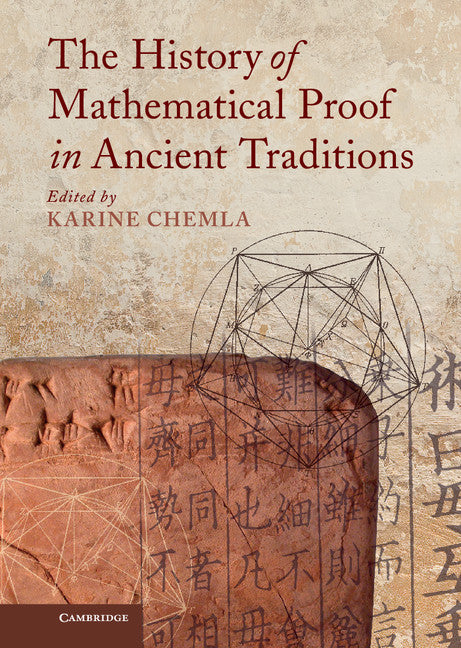Freshly Printed - allow 8 days lead
Couldn't load pickup availability
The History of Mathematical Proof in Ancient Traditions
This volume explores the nature of mathematical proof in a range of historical settings, providing the first comprehensive history of proof.
Karine Chemla (Edited by)
9781107012219, Cambridge University Press
Hardback, published 5 July 2012
614 pages, 93 b/w illus. 29 tables
25.5 x 18 x 3.6 cm, 1.35 kg
'The purpose of the book … is to challenge the standard narrative and design a research program to replace it with a more adequate assessment of the achievements of non-Greek mathematicians in antiquity. The pivotal question is, in what sense and by what methods were mathematical procedures justified in showing that they always produce correct results when applied?' Jochen Brüning, Common Knowledge
This radical, profoundly scholarly book explores the purposes and nature of proof in a range of historical settings. It overturns the view that the first mathematical proofs were in Greek geometry and rested on the logical insights of Aristotle by showing how much of that view is an artefact of nineteenth-century historical scholarship. It documents the existence of proofs in ancient mathematical writings about numbers and shows that practitioners of mathematics in Mesopotamian, Chinese and Indian cultures knew how to prove the correctness of algorithms, which are much more prominent outside the limited range of surviving classical Greek texts that historians have taken as the paradigm of ancient mathematics. It opens the way to providing the first comprehensive, textually based history of proof.
Prologue: historiography and history of mathematical proof: a research program Karine Chemla
Part I. Views on the Historiography of Mathematical Proof: 1. The Euclidean ideal of proof in The Elements and philological uncertainties of Heiberg's edition of the text Bernard Vitrac
2. Diagrams and arguments in ancient Greek mathematics: lessons drawn from comparisons of the manuscript diagrams with those in modern critical editions Ken Saito and Nathan Sidoli
3. The texture of Archimedes' arguments: through Heiberg's veil Reviel Netz
4. John Philoponus and the conformity of mathematical proofs to Aristotelian demonstrations Orna Harari
5. Contextualising Playfair and Colebrooke on proof and demonstration in the Indian mathematical tradition (1780–1820) Dhruv Raina
6. Overlooking mathematical justifications in the Sanskrit tradition: the nuanced case of G. F. Thibaut Agathe Keller
7. The logical Greek versus the imaginative Oriental: on the historiography of 'non-Western' mathematics during the period 1820–1920 François Charette
Part II. History of Mathematical Proof in Ancient Traditions: The Other Evidence: 8. The pluralism of Greek 'mathematics' Geoffrey Lloyd
9. Generalizing about polygonal numbers in ancient Greek mathematics Ian Mueller
10. Reasoning and symbolism in Diophantus: preliminary observations Reviel Netz
11. Mathematical justification as non-conceptualized practice: the Babylonian example Jens Høyrup
12. Interpretation of reverse algorithms in several Mesopotamian texts Christine Proust
13. Reading proofs in Chinese commentaries: algebraic proofs in an algorithmic context Karine Chemla
14. Dispelling mathematical doubts: assessing mathematical correctness of algorithms in Bhaskara's commentary on the mathematical chapter of the Aryabhat?ya Agathe Keller
15. Argumentation for state examinations: demonstration in traditional Chinese and Vietnamese mathematics Alexei Volkov
16. A formal system of the Gougu method - a study on Li Rui's detailed outline of mathematical procedures for the right-angled triangle Tian Miao.
Subject Areas: History of science [PDX], Western philosophy: Ancient, to c 500 [HPCA], Ancient history: to c 500 CE [HBLA]


